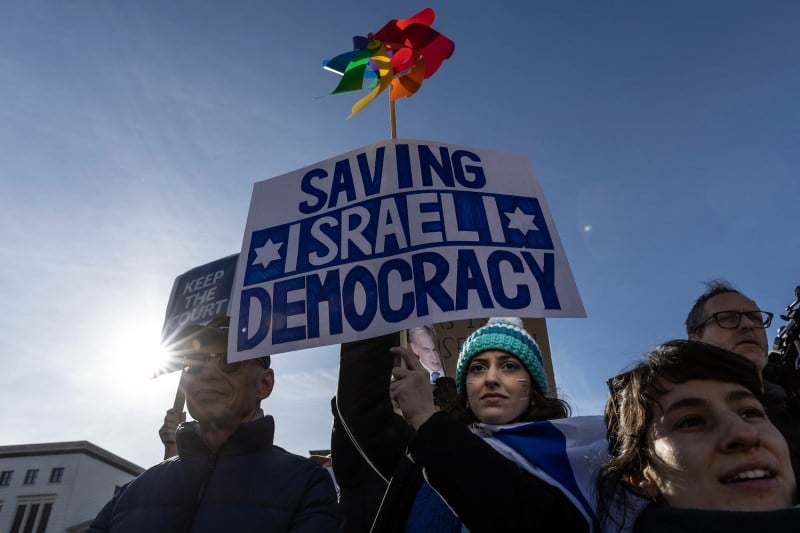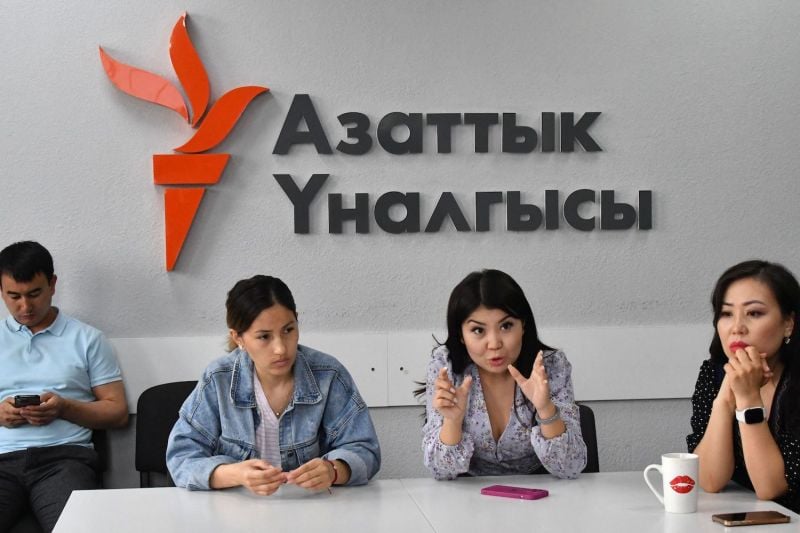Proposed Laws Would Devastate Rights Groups in Israel

Proposed Laws Would Devastate Rights Groups in Israel
Netanyahu’s government is targeting their foreign funding.
People demonstrate at the Brandenburg Gate during the visit of Israeli Prime Minister Benjamin Netanyahu against proposed legislation that would undermine the role of Israel’s Supreme Court, seen in Berlin on March 16, 2023. Maja Hitij/Getty Images
For years, right-wing governments have been passing measures that make it harder for human rights groups and other civil society organizations to operate in Israel. Now, two bills making their way through parliament would go further—denying funding for these groups and criminalizing some of their activities.
The bills, which cast some of these nongovernmental organizations (NGOs) as foreign agents, would impose an 80 percent tax on the foreign government donations that sustain the groups as well as prison sentences of up to five years if they cooperate with the International Criminal Court (ICC). Last year, the court issued arrest warrants against Prime Minister Benjamin Netanyahu and then-Defense Minister Yoav Gallant for alleged war crimes and crimes against humanity in their conduct of the devastating war against Hamas in Gaza.
For years, right-wing governments have been passing measures that make it harder for human rights groups and other civil society organizations to operate in Israel. Now, two bills making their way through parliament would go further—denying funding for these groups and criminalizing some of their activities.
The bills, which cast some of these nongovernmental organizations (NGOs) as foreign agents, would impose an 80 percent tax on the foreign government donations that sustain the groups as well as prison sentences of up to five years if they cooperate with the International Criminal Court (ICC). Last year, the court issued arrest warrants against Prime Minister Benjamin Netanyahu and then-Defense Minister Yoav Gallant for alleged war crimes and crimes against humanity in their conduct of the devastating war against Hamas in Gaza.
The NGOs that stand to be affected include the Association for Civil Rights in Israel, B’Tselem, and Breaking the Silence—groups that document and challenge abuses against Palestinians by Israeli security forces, Jewish settlers, and the state. Some of these groups have been operating since the early years of Israel’s occupation of the West Bank and Gaza, which began in 1967.
The parliamentary push is so dramatic that, if successful, it would change the face of Israeli society, according to analysts.
“The goal is to eliminate the criticism of the actions of the government, especially everything related to human rights,” said Ziv Stahl, the director of an organization called Yesh Din (There is Law), which monitors spiking settler violence and documents the absence of accountability for it. “If the taxation law passes it means the elimination of civil society in Israel,” she added.
Stahl said that Yesh Din, funded largely by the European Union and European states, would likely close down if the coalition uses its majority to approve the taxation bill, which passed its preliminary reading in late February.
The two proposed laws “join in a worldwide trend of withdrawal from the values and world order established after the Second World War of a human rights regime and international law,” Stahl said.
The bill banning contact with the ICC passed its preliminary reading on Feb. 19, two weeks after the White House issued an executive order specifying sanctions against Karim Khan—the court’s chief prosecutor—and those who work on the court’s investigations of U.S. citizens or those of U.S. allies, including Israel. Both the Israeli and American moves were prompted by the ICC’s issuing of the arrest warrants against Netanyahu and Gallant.
The court also issued an arrest warrant for Hamas armed wing commander Mohammed Deif, who helped plan the attack against Israel on Oct. 7, 2023, which killed about 1,200 people and triggered the war centered in Gaza. (Deif had been killed in an Israel airstrike in August 2024, but Hamas didn’t confirm his death until after the ICC announced the warrant.)
NGO leaders say that the Trump administration’s order provided justification for the Israeli bill banning contact with the ICC.
“You can’t exaggerate the effect the Trump administration has on us,” said Tal Steiner, the director of the Public Committee Against Torture in Israel (PCATI), who sees the ICC as an essential accountability mechanism. “It emboldens the Israeli government to take harsher and harsher steps toward us.”
PCATI has sought to track abuses, torture, and deaths in Israeli detention of Palestinians during the war, topics that most of the Israeli media and public have avoided while focusing on the dire plight of Israeli hostages held by Hamas.
The Trump order has also affected Israeli rights groups. It forced a key funder, the New York-based New Israel Fund, to condition its support for grantees on their committing to avoid “proactively sending information to the ICC in order to cooperate with a case,” said the organization’s Israel director, Mickey Gitzin.
“We had to make sure all of our grantees … are not going to break the law in any way despite our deep disagreement with the administration for shrinking the space for human rights organizations and other organizations to do their work,” Gitzin added.
“The reports and the publicizing part of their work must continue, and we are very proud to support it. The moment that will end, basically Israeli democracy is over. It’s not shrinking space—it’s the end of democracy, full stop,” he said.
With the decline of dovish parties in Israel, the NGOs see themselves as the key standard-bearers in the fight against the occupation of the West Bank, where some 2.2 million Palestinians live under harsh military rule. Some of these groups refer to the political condition in the West Bank as apartheid—pointing to the fact that Palestinians live under restrictive military law while Jewish settlers enjoy the benefits of Israeli civilian law. But Israel says that the foreign government funding received by these NGOs is actually a mechanisms for other countries to meddle in Israeli affairs.
“They are not NGOs; they are FGOs—foreign government organizations,” said Ariel Kellner, the sponsor of the taxation bill from Netanyahu’s Likud party. “We have to protect our sovereignty.”
“Israeli civil society is intended to reflect what is happening in our civil society. When a foreign country interferes in the internal affairs of another country by means of funding associations, this is problematic,” Kellner said.
The bill is worded in a way that leaves right-wing groups untouched, including by giving the finance minister discretionary exemption power. Private donations that, for example, sustain settler groups in East Jerusalem would continue to be untaxed. The big fear for progressives is that civil society will become a platform monopolized by extreme nationalists bent on dispossessing Palestinians and perpetuating right-wing rule.
NGO directors and human rights lawyers stress that even if the tax rate comes down from 80 percent in future iterations of the bill, the groups will still be devastated, since many donors condition their support on NGOs not paying any tax to the host government.
“If the taxation law passes, then civil society in Israel is entering a whole new era,” said Michael Sfard, a prominent human rights lawyer who represents several NGOs. Sfard said that groups advocating for environmental protection, LGBTQ rights, and other “social change” issues would also be hit.
The NGOs counter the criticism of their foreign funding by stressing that the occupation is an international issue and that their donors are democracies. Two years ago, during the Biden administration, an earlier version of the NGO tax bill was thwarted amid pressure from the U.S. State Department and European Union. But the Trump administration is unlikely to protest.
The threat to Israeli NGOs comes precisely at a moment when their scrutiny is most needed. Since resuming its war on Gaza in March, Israel has blocked humanitarian aid to Palestinians and stepped up airstrikes, killing many Palestinian civilians. At the same time, the military is mounting what it says is an anti-terrorism campaign in refugee camps in the northern West Bank, which has displaced an estimated 40,000 people.
Critics of the government see the bills as an integral part of a shift by Netanyahu to an authoritarian system by reducing checks on his power from the judiciary, the media, and civil society.
But Netanyahu’s backers say he is actually making Israel more democratic by ensuring that the government can act in accordance with the will of the majority as expressed in the 2022 election, which produced the most nationalist and anti-Arab coalition in Israel’s history
Kellner, the legislator, said that it is essential to ban contact with the ICC.
“These institutions were established to defend humanity, but they were hijacked by the most brutal enemies of humanity,” he said during the interview. “If the result is that the prime minister of Israel—the democratic country in the Middle East that was attacked by the barbarians of Hamas—is placed on the same level as Hamas, then apparently something has gotten mixed up and needs to be fixed.”
From the government’s viewpoint, success of the crackdown would deliver a long overdue crushing blow to groups that threaten the consensus on security issues, shine a spotlight on harsh and internationally banned practices, and raise questions about the country’s efforts to depict itself as a democracy.
Hassan Jabareen, the director of Adalah-the Legal Center for Arab Minority Rights in Israel, said that the proposed law banning contact with the ICC is “very problematic”
Under the law, Jabareen said, he could be punished for writing an academic article arguing that Israel is committing genocide in Gaza if the ICC references quotes from it.
“If the ICC issues me an order to come and express my opinion before them, and I don’t want to be in a situation in which I don’t comply with a request by the ICC and I attend and express an opinion, does this mean that I enter criminality?” Jabareen asked. He said that Adalah would petition Israel’s High Court of Justice to cancel the law if it’s passed.
“Human rights organizations must cooperate with international bodies, and to limit them is to limit their work, their freedom of expression, and their freedom of conscience,” Jabareen said.
Ben Lynfield is a former Arab affairs correspondent at the Jerusalem Post. He has written for the National, the Independent, and the Christian Science Monitor.
More from Foreign Policy
-

U.S. President Donald Trump gives a thumbs-up upon arrival at Joint Base Andrews in Maryland after spending the weekend at Mar-a-Lago. How to Ruin a Country
A step-by-step guide to Donald Trump’s destruction of U.S. foreign policy.
-

Chinese President Xi Jinping arrives for a meeting with Vietnamese National Assembly Chairman Tran Thanh Man in Hanoi on April 14. Why Beijing Is Standing Up to Trump
Chinese leaders have their pride, too.
-

Russian soldiers practice marching Why Don’t Russian Soldiers Revolt?
Astonishing death rates and brutal abuse have not kept troops from following orders.
-

An illustration shows a police officer trying to sudue a panicked mob of men. The Awful History of Tariffs and Depressions
What the 19th century teaches us about what happens next.









Join the Conversation
Commenting on this and other recent articles is just one benefit of a Foreign Policy subscription.
Already a subscriber?
.
Subscribe
Subscribe
View Comments
Join the Conversation
Join the conversation on this and other recent Foreign Policy articles when you subscribe now.
Subscribe
Subscribe
Not your account?
View Comments
Join the Conversation
Please follow our comment guidelines, stay on topic, and be civil, courteous, and respectful of others’ beliefs.
Change your username |
Log out
Change your username:
CANCEL
Confirm your username to get started.
The default username below has been generated using the first name and last initial on your FP subscriber account. Usernames may be updated at any time and must not contain inappropriate or offensive language.